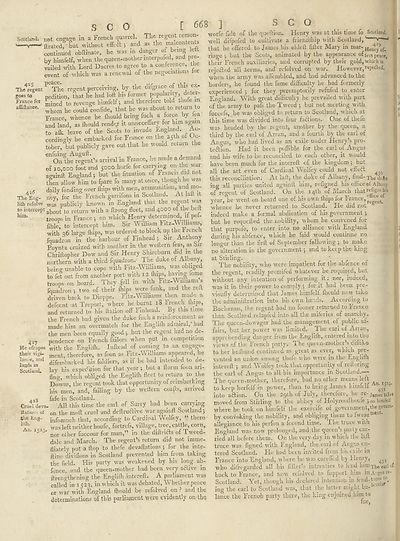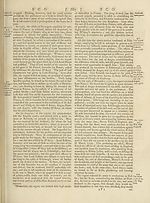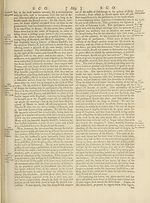Encyclopaedia Britannica, or, a Dictionary of arts, sciences, and miscellaneous literature : enlarged and improved. Illustrated with nearly six hundred engravings > Volume 18, RHI-SCR
(706) Page 668
Download files
Complete book:
Individual page:
Thumbnail gallery: Grid view | List view

'Scotland.
42S
The regent
goes to
France for
affiftanee.
425
The Eng-
li£h refolve
to intercept
him*
SCO [
not engage in a French quarrel. The regent remon-
ftrated, but without efft-a ; and as the malcontents
continued obftinate, he was in danger of being left
by himfelf, when the queen-mother mterpoied, and pre¬
vailed with Lord Dacres to agree to a conference, the
event of which was a renewal of the negociations tor
^ The regent perceiving, by the difgrace of this ex¬
pedition, that he had loft his former popularity, deter¬
mined to revenge himfelf j and therefore told tnole m
whom he could confide, that he was about to return to
France, whence he ftiould bring fuch a force by lea
and land, as Ihould render it unneceffary for him again
to a Ik leave of the Scots to invade England. Ac¬
cordingly he embarked for France on the 25th of Oc¬
tober, but publicly gave out that he would return the
enOn Urn rfglnt’s arrival in France, he made a demand
of 10,000 foot and 50CO horfe for carrying on the war
againft England *, but the lituation of Francis did not
then allow him to fpare fo many at once, though he was
daily fending over fhips with men, ammunition, and mo¬
ney, for the French garrifons in Scotland. At laft it
wi publicly known in England that the regent was
about to return with a ftrong fleet, and 4000 of the be ft
troops in France ; on which Henry determined, if pol-
fible, to intercept him. Sir William Iitz-Williama,
•with q6 large fhips, was ordered to block up the french
iquadron in the harbour of Finhead j Sir Anthony
Poyntz cruized with another in the weftern leas, as Sir
Chriftopher Dow and Sir Henry Shireburn did m the
northern with a third fquadron. The duke of Albany,
being unable to cope with Fitz-Williams, was obliged
668 ] SCO
worfe fide of the queftion. Henry was at this time fo Scotland,
well difpofed to cultivate a friendftnp with Scotland,
that he offered to James his eldeft filler Mary in mar- Hen4rJ9of,
riage j but the Scots, animated by the appearance offers peace,
their French auxiliaries, and corrupted by their gold, which is
rejefled all terms, and refolved on war. However, reJe^ed.
when the army was aflembled, and had advanced to the
borders, he found the fame difficulty he had formerly
experienced ; for they peremptorily refufed to enter
England. With great difficulty he prevailed with part
of the army to pafs the Tweed ; but not meeting with
fuceefs, he was obliged to return to Scotland, which at
this time was divided into four fadlions. One of thefe
was headed by the regent, another by the queen, a
third by the earl of Arran, and a fourth by the earl of
Angus, who had lived as an exile under Henry’s pro-
tedion. Had it been poflible for the earl of Angus
and his wife to be reconciled to each other, it would
have been much for the inrereft of the kingdom j but
all the art even of Cardinal Woliey could not effe£l
this reconciliation. At laft, the du.si.e of Albany, find-xhe dutt
ing all parties united againft him, refigned his office of Albany
of regent of Scotland. On the 14th of March that^g^jaw
year, he went on board one of his own (hips for France,”
whence he never returned to Scotland. He did not
indeed make a formal abdication of his government
but he requefted the nobility, whom he convened for
that purpofe, to enter intc> no alliance with England,
during his abfence, which he faid would continue no
longer than the fir ft of September following ; to make
no alteration in the government , and to keep the king
at Stirling. _ . re
The nobility, who were impatient for the abfence of
427
He efcapes
therr vigi¬
lance, and
lands in
Scotland.
428
Cruel deva
itations of
She Eng-
lifh.
An. 1523.
defeent at Treport. where he burnt 18 French flaps,
and returned to his ftation off Finhead. _ By this time
the French had given the duke, fuch a reinforcement as
made him an overmatch for the Englifh admiral, had
the men been equally good; but the regent had no de¬
pendence on French failors when put m competition
with the Englilh. Inftead of coming to an engage¬
ment. therefore, as foon as Fitz-Williams appeared, he
difembarked his foldiers, as if he had intended to de¬
lay his expedition for that year ; but a ftorm loon an-
fing, which obliged the Engliffi fleet to return to the
Downs, the regent took that opportunity of reimbarkmg
his men, and, failing by the weftern coaffs, arrived
fafe in Scotland.
- All this time the earl of Surry had been carrying
on the moft cruel and deftru&ive war againft Scotland j
infomuch that, according to Cardinal Wolfey, “ there
was left neither houfe, fortrefs, village, tree, cattle, corn,
nor other fuccour for man,” in the diftriefs of 1 weed-
dale and March. The regent’s return did not imme¬
diately put a flop to thefe devaftations ; for the inte-
ftine diviiions in Scotland prevented him fiom taking
the field. His party was weakened by his long ab-
fcnee, and the queen-mother had been very aftive in
ftrengthening the Englilh intereft. A parliament was
called in 1523, in which it was debated, Whether peace
or war with England fhould be refolved on ? and the
determinations of this parliament were evident^ on the
the adminiftiation into his own hands. According to
Buchanan, the regent had no fooner returned to k ranee
than Scotland relapfed into all the miferies of anarchy.
The queen-dowager had the management of public af¬
fairs, but her power was limited. J he earl of Arran,
apprehending danger from the Engiilh, entered into the
views of the French party. Ml he queen-mother’s diflike
to her hufband continued as great as ever, which pre¬
vented an union among thole who were in the ICnghfU
intereft ^ and Wolfey took that opportunity of reftoring
the earl of Angus to all his importance in Scotland.——
The queen-mother, therefore, had no other means left ^
to keep herfelf in power, than to bring .lames nimftk ^
into aftion. On the 2qth of July, therefore, he ’-e- james ttbei
moved from Stirling to the abbey of Holyroodhoufe j 0n himfelf
where he took on himfelf the exercife of government, the govern-
by convoking the nobility, and obliging them to i\vTearme
allegiance to his perfon a fecond time. I.he truce with
England was now prolonged, and the queen’s party car¬
ried all before them. On the very day in which the laft
truce was figned with England, the earl of Angus en¬
tered Scotland. He had been invited from his exile in
France into England, where he was careffcd by Hemy,
who difregarded all his filler’s intreaties to fend hmixheearlof
back to Fiance, and now refolvcd to fupport him in A- gns re-
Scotland. Yet, though his declared intention in fend-turns
ing the earl to Scotland was, that the latter might ba- c
lance the French party there, the king enjoined him to
fue,
42S
The regent
goes to
France for
affiftanee.
425
The Eng-
li£h refolve
to intercept
him*
SCO [
not engage in a French quarrel. The regent remon-
ftrated, but without efft-a ; and as the malcontents
continued obftinate, he was in danger of being left
by himfelf, when the queen-mother mterpoied, and pre¬
vailed with Lord Dacres to agree to a conference, the
event of which was a renewal of the negociations tor
^ The regent perceiving, by the difgrace of this ex¬
pedition, that he had loft his former popularity, deter¬
mined to revenge himfelf j and therefore told tnole m
whom he could confide, that he was about to return to
France, whence he ftiould bring fuch a force by lea
and land, as Ihould render it unneceffary for him again
to a Ik leave of the Scots to invade England. Ac¬
cordingly he embarked for France on the 25th of Oc¬
tober, but publicly gave out that he would return the
enOn Urn rfglnt’s arrival in France, he made a demand
of 10,000 foot and 50CO horfe for carrying on the war
againft England *, but the lituation of Francis did not
then allow him to fpare fo many at once, though he was
daily fending over fhips with men, ammunition, and mo¬
ney, for the French garrifons in Scotland. At laft it
wi publicly known in England that the regent was
about to return with a ftrong fleet, and 4000 of the be ft
troops in France ; on which Henry determined, if pol-
fible, to intercept him. Sir William Iitz-Williama,
•with q6 large fhips, was ordered to block up the french
iquadron in the harbour of Finhead j Sir Anthony
Poyntz cruized with another in the weftern leas, as Sir
Chriftopher Dow and Sir Henry Shireburn did m the
northern with a third fquadron. The duke of Albany,
being unable to cope with Fitz-Williams, was obliged
668 ] SCO
worfe fide of the queftion. Henry was at this time fo Scotland,
well difpofed to cultivate a friendftnp with Scotland,
that he offered to James his eldeft filler Mary in mar- Hen4rJ9of,
riage j but the Scots, animated by the appearance offers peace,
their French auxiliaries, and corrupted by their gold, which is
rejefled all terms, and refolved on war. However, reJe^ed.
when the army was aflembled, and had advanced to the
borders, he found the fame difficulty he had formerly
experienced ; for they peremptorily refufed to enter
England. With great difficulty he prevailed with part
of the army to pafs the Tweed ; but not meeting with
fuceefs, he was obliged to return to Scotland, which at
this time was divided into four fadlions. One of thefe
was headed by the regent, another by the queen, a
third by the earl of Arran, and a fourth by the earl of
Angus, who had lived as an exile under Henry’s pro-
tedion. Had it been poflible for the earl of Angus
and his wife to be reconciled to each other, it would
have been much for the inrereft of the kingdom j but
all the art even of Cardinal Woliey could not effe£l
this reconciliation. At laft, the du.si.e of Albany, find-xhe dutt
ing all parties united againft him, refigned his office of Albany
of regent of Scotland. On the 14th of March that^g^jaw
year, he went on board one of his own (hips for France,”
whence he never returned to Scotland. He did not
indeed make a formal abdication of his government
but he requefted the nobility, whom he convened for
that purpofe, to enter intc> no alliance with England,
during his abfence, which he faid would continue no
longer than the fir ft of September following ; to make
no alteration in the government , and to keep the king
at Stirling. _ . re
The nobility, who were impatient for the abfence of
427
He efcapes
therr vigi¬
lance, and
lands in
Scotland.
428
Cruel deva
itations of
She Eng-
lifh.
An. 1523.
defeent at Treport. where he burnt 18 French flaps,
and returned to his ftation off Finhead. _ By this time
the French had given the duke, fuch a reinforcement as
made him an overmatch for the Englifh admiral, had
the men been equally good; but the regent had no de¬
pendence on French failors when put m competition
with the Englilh. Inftead of coming to an engage¬
ment. therefore, as foon as Fitz-Williams appeared, he
difembarked his foldiers, as if he had intended to de¬
lay his expedition for that year ; but a ftorm loon an-
fing, which obliged the Engliffi fleet to return to the
Downs, the regent took that opportunity of reimbarkmg
his men, and, failing by the weftern coaffs, arrived
fafe in Scotland.
- All this time the earl of Surry had been carrying
on the moft cruel and deftru&ive war againft Scotland j
infomuch that, according to Cardinal Wolfey, “ there
was left neither houfe, fortrefs, village, tree, cattle, corn,
nor other fuccour for man,” in the diftriefs of 1 weed-
dale and March. The regent’s return did not imme¬
diately put a flop to thefe devaftations ; for the inte-
ftine diviiions in Scotland prevented him fiom taking
the field. His party was weakened by his long ab-
fcnee, and the queen-mother had been very aftive in
ftrengthening the Englilh intereft. A parliament was
called in 1523, in which it was debated, Whether peace
or war with England fhould be refolved on ? and the
determinations of this parliament were evident^ on the
the adminiftiation into his own hands. According to
Buchanan, the regent had no fooner returned to k ranee
than Scotland relapfed into all the miferies of anarchy.
The queen-dowager had the management of public af¬
fairs, but her power was limited. J he earl of Arran,
apprehending danger from the Engiilh, entered into the
views of the French party. Ml he queen-mother’s diflike
to her hufband continued as great as ever, which pre¬
vented an union among thole who were in the ICnghfU
intereft ^ and Wolfey took that opportunity of reftoring
the earl of Angus to all his importance in Scotland.——
The queen-mother, therefore, had no other means left ^
to keep herfelf in power, than to bring .lames nimftk ^
into aftion. On the 2qth of July, therefore, he ’-e- james ttbei
moved from Stirling to the abbey of Holyroodhoufe j 0n himfelf
where he took on himfelf the exercife of government, the govern-
by convoking the nobility, and obliging them to i\vTearme
allegiance to his perfon a fecond time. I.he truce with
England was now prolonged, and the queen’s party car¬
ried all before them. On the very day in which the laft
truce was figned with England, the earl of Angus en¬
tered Scotland. He had been invited from his exile in
France into England, where he was careffcd by Hemy,
who difregarded all his filler’s intreaties to fend hmixheearlof
back to Fiance, and now refolvcd to fupport him in A- gns re-
Scotland. Yet, though his declared intention in fend-turns
ing the earl to Scotland was, that the latter might ba- c
lance the French party there, the king enjoined him to
fue,
Set display mode to:
![]() Universal Viewer |
Universal Viewer | ![]() Mirador |
Large image | Transcription
Mirador |
Large image | Transcription
Images and transcriptions on this page, including medium image downloads, may be used under the Creative Commons Attribution 4.0 International Licence unless otherwise stated. ![]()
| Permanent URL | https://digital.nls.uk/193027885 |
|---|
| Attribution and copyright: |
|
|---|
| Description | Ten editions of 'Encyclopaedia Britannica', issued from 1768-1903, in 231 volumes. Originally issued in 100 weekly parts (3 volumes) between 1768 and 1771 by publishers: Colin Macfarquhar and Andrew Bell (Edinburgh); editor: William Smellie: engraver: Andrew Bell. Expanded editions in the 19th century featured more volumes and contributions from leading experts in their fields. Managed and published in Edinburgh up to the 9th edition (25 volumes, from 1875-1889); the 10th edition (1902-1903) re-issued the 9th edition, with 11 supplementary volumes. |
|---|---|
| Additional NLS resources: |
|

